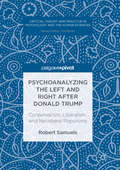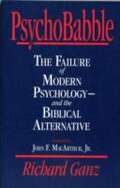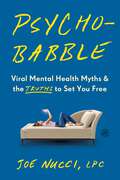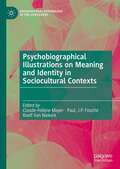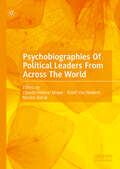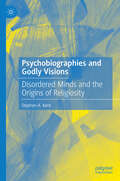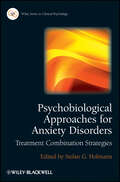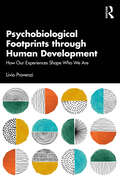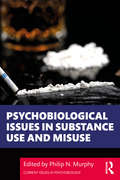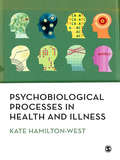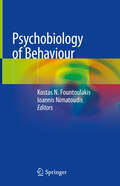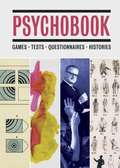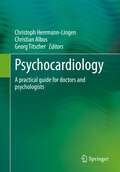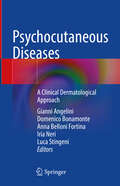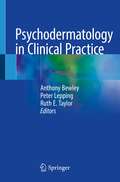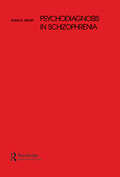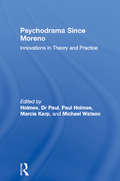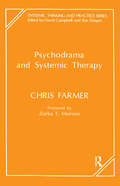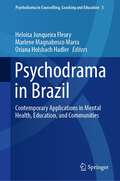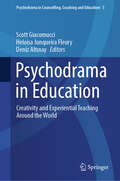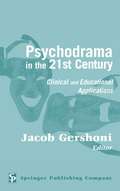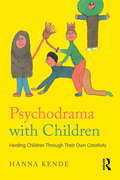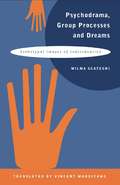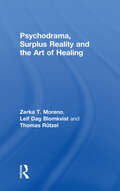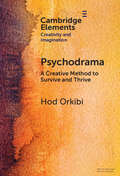- Table View
- List View
Psychoanalyzing the Left and Right after Donald Trump
by Robert SamuelsThis book outlines a new model for global social justice movements that is based on Freud and Lacan's central insights regarding the unconscious, repetition, drives, and transference. Since most of our current social issues are global in nature, Bob Samuels convincingly argues that we need a global solution, but that global solidarity is blocked by narcissistic nationalism and the capitalist death drive. In examining contemporary social movements for global justice, Samuels articulates a comprehensive theory of non-pathological social solidarity, and argues that in the age of multinational corporations and global climate change, we need a new model of global justice and government that requires an understanding of analytic neutrality and free association. This book uses psychoanalytic theories and practices to explain how someone like Trump can rise to power, and explores why liberals have failed to provide a convincing or effective political alternative. It will be compelling reading to students and teachers in a range of psychological and political disciplines, and to anyone interested in psychoanalysis and current politics.
Psychobabble: The Failure of Modern Psychology -- and the Biblical Alternative
by Richard GanzWhy is it many evangelical preachers shout from the pulpit about God's power, but they shuffle their emotionally troubled members off to the closest therapist? Both church leaders and laypersons seem to believe that the psychological "experts" have the answers for the wounded hearts and souls of God's people. And when churches do offer counseling, it often is tinged with the secular psychology and psychotherapy that have infiltrated the church. <p><p> Psychobabble explains the dichotomy between secular and Biblical counseling and shows the danger of incorporating secular techniques into a Christian approach. This book will arm believers looking for Scriptural answers to the hurts of a broken world. As anti-Christian bias becomes increasingly pervasive in secular psychology, the church must look to the true source of all healing. This book will point the way.
Psychobabble: Viral Mental Health Myths & the Truths to Set You Free
by Joe Nucci, LPCPsychotherapist Joe Nucci (@JoeNucciTherapy) shares truth and research as he discusses common mental health myths and replaces them with no-nonsense truths and accessible guidance for real healing.The popularization of mental health content on social media has led to an epidemic of mental health misinformation. In Psychobabble, licensed psychotherapist Joe Nucci argues that too many of us are self-diagnosing, improperly deploying therapy-speak, and even coaching others to engage in harmful activities under the guise of “self-care.”Nucci dismantles 40 popular misconceptions, such as:Everyone needs to go to therapy.Your feelings are credible.People gaslight you when they disagree.Mindfulness is good for everyone.Everyone has trauma.The reason you can’t focus is ADHD.This dangerous misinformation encourages well-meaning individuals to make consequential life decisions based on false beliefs, half-truths, and the advice of unlicensed armchair experts. It is time for a professional to call this out. Nucci replaces these myths with liberating truths that can help readers avoid misinformation, navigate important philosophical debates, and better maneuver their own mental health journeys. He shares client examples and evidence-based psychological theory, and draws from reputable studies and research.TikTok influencers and “life coaches” create viral videos telling people to cut off their problematic parents, and are cheered on by millions of followers. Recent divorcees proudly declare on Instagram that they are finally healing from their “narcissistic” ex-partner, even though you get the sense they can’t actually define that word. Teenage “mental health advocates” lament the struggles of living with autism, but then subtly add that their condition is “self-diagnosed.” It is time for a professional to call out the misinformation and absurdity.Psychobabble is a must-read book for anyone who values mental health and cares about others.
Psychobiographical Illustrations on Meaning and Identity in Sociocultural Contexts (Sociocultural Psychology of the Lifecourse)
by Claude-Hélène Mayer Paul, J. P. Fouché Roelf Van NiekerkThis book explores psychobiography with focus on meaning making and identity development in the life and works of extraordinary individuals. Meaning-making and identity development are existential constructs influencing psychological development, mental health and wellbeing across the lifecourse. The chapters illustrate through the eyes of 25 international psychobiographers various theoretical and methodological approaches to psychobiography. They explore how individuals, such as Angela Merkel, Karl Lagerfeld, Henri Nouwen, Vivian Maier, Charles Baudelaire, W.E.B. du Bois, Loránt Hegedüs, Kim Philby, Zoltan Paul Dienes, Albertina Sisulu, Ruth First, Sokrates, and Jesus construct their lives to make meaning, develop their identities and grow as individuals within their sociocultural contexts. The texts provide deep insight into life’s development.
Psychobiographies Of Political Leaders From Across The World
by Claude-Hélène Mayer Roelf Van Niekerk Moshe BanaiThe authors explore the life and leadership of extraordinary political leaders in different socio-cultural contexts and epochs and present new insights in political psychobiography. They investigate the lives, personalities, politics, philosophies, careers, leadership and leadership styles of leaders from the UK, Germany, France, South Africa, China, Turkey and Zimbabwe and lead discourses on the advancement of contemporary theories and methodologies. A must read to understand leaders and leadership in historical, contemporary, cultural and intercultural perspectives!
Psychobiographies and Godly Visions: Disordered Minds and the Origins of Religiosity
by Stephen A. KentThis book argues that the religious visions and experiences of many religious founders were the result of mental health disorders or neurological conditions, thereby calling into question supernatural origins about the faiths that they developed. It constructs this argument by extensively utilizing psychiatric and other mental health and medical material that social scientists and religious studies scholars have underutilized in their analyses of religious experiences. Using a multi-disciplinary approach to examine psychobiographies of numerous major and minor religious figures in Judaism, Christianity, and Islam (Ezekiel, Sabbatai Şevi, St. Paul, John Wesley, and Muhammad), along with leaders of many newer or alternative sects and cults (Rajneesh, Charles Manson, L. Ron Hubbard, David Berg, Marshall Applewhite, Jim Jones, Sun Myung Moon, and Elizabeth Clare Prophet). The book integrates material from religious studies, psychiatry and psychology, neurology, and the social sciences to address issues related to religions&’ origins. Its extensive bibliography makes it an indispensable resource for scholars of psychiatry and religion, new religious movements, and religious narcissism.
Psychobiological Approaches for Anxiety Disorders
by Stefan G. HofmannPsychobiological Approaches for Anxiety Disorders presents a comprehensive overview of the latest empirical evidence and research results on combining pharmacological agents and CBT techniques for the treatment of anxiety disorders.The first book to focus on the issue of enhancing CBT with pharmacological agents Features chapters from leading authors in the fields of psychiatry, pharmacology, clinical psychology, neuroscience, and emotion researchContributes significantly to the field by summarizing the contemporary research in combination treatments in anxiety disordersA valuable resource for clinicians in training, as well as experienced clinicians seeking to help patients with anxiety disorders
Psychobiological Footprints through Human Development: How Our Experiences Shape Who We Are
by Livio ProvenziEmbark on an illuminating voyage through the biological foundations of human nature and development with Psychobiological Footprints through Human Development. This unique volume unveils the intricate dance between genetics, neuroscience, and environment, offering a holistic understanding of how we become who we are.This comprehensive book examines the psychobiological, neuroendocrine, and epigenetic mechanisms that regulate developmental processes in typical development and under conditions of developmental risk. Moving within a dynamic systems epistemic framework and capitalizing from the heritage of the infant research field, it provides a solid framework for comprehending the interplay of nature and nurture. With a captivating blend of theoretical principles, processes, and contextual applications, this book transcends academic boundaries to empower anyone interested in the intricacies of human development.Psychobiological Footprints through Human Development is a guide to discovering how our life experiences contribute to making us who we are and therefore it is invaluable to graduate students in the fields of developmental psychology, neuroscience, genetics, and related disciplines. Delving into the biological roots of behaviour, cognition, and emotion, it will also equip practitioners, researchers, and educators with invaluable insights to enrich their practice.
Psychobiological Issues in Substance Use and Misuse (Current Issues in Psychobiology)
by Philip N. MurphyIn this book, Murphy brings together a team of international experts to review cutting-edge scientific literature from the field of psychobiology and related disciplines which addresses important questions and broadens our understanding of substance use behaviours. The reader is introduced to the multi-faceted nature of substance use and misuse, and its growing need to be discussed across diverse disciplines and perspectives. The book also addresses important questions regarding public policy and professional practice in the context of different social and cultural environments, and comments on the methodological and ethical issues in substance use and misuse. Chapters explore a spectrum of substances, which include: cocaine, alcohol, ecstasy (MDMA), methamphetamine, synthetic cannabinoids, tobacco, ketamine, novel psychoactive substances, and vaping products. The use of these substances poses important questions for science and for society. This book is written to help academics, practitioners, and students in a variety of academic and professional disciplines answer those questions while staying up to date with the psychobiological literature. This is a vital resource for professionals and upper-level undergraduate and postgraduate students undertaking research in areas related to biological psychology, biology, health studies, and medicine.
Psychobiological Processes in Health and Illness
by Kate Hamilton-WestAn engaging introduction to the interrelationships between mind and body across a broad range of topics including infectious illness, autoimmunity, cancer and pain. Taking a biopsychosocial approach, it brings together research from a number of disciplines including health psychology, psychoneuroimmunology and behavioural genetics.<P><P> Students are encouraged to consider how advances in psychobiological research can help us to uncover the true complexity of links between psychological, biological and social processes with respect to implications for health and how such advances can inform the development of interventions and treatment.
Psychobiology of Behaviour
by Kostas N. Fountoulakis Ioannis NimatoudisThe book provides a comprehensive reference on the neurobiological understanding of behaviour, how behaviour is regulated by the brain, and how such behaviours in turn influence the brain. The work offers an introduction to neural systems and genetics/epigenetics, followed by detailed study of a wide range of behaviours – temperament and personality, instincts and drives, memory and cognitive function, sex and sexual differentiation, ethology and evolutionary biology, aging, drug abuse and other problematic behaviors, psychophysiology and ultimately the links to biological psychiatry and psychopharmacology. Research findings on the neural basis of social behaviour are integrated across different levels of analysis, from molecular neurobiology and neural systems/behavioural neuroscience to fMRI imaging data on human social behaviour. The content covers research on both normal and abnormal behaviours, as well as developmental aspects. The target audience includes psychiatrists, neurologists, nurses, psychologists and all researchers and advanced students in behavioural, social and developmental neuroscience, as well as clinical neuroscientists.
Psychobook: Games, Tests, Questionnaires, Histories
by Lionel Shriver Wall Oison Mel Gooding Julian RothensteinWho knew a trip to the therapist could be so much fun, even aesthetically rewarding? Beyond sharing feelings or complaining about your mother, Psychobook reveals the rich history of psychological testing in a fascinating sideways look at classic testing methods, from word-association games to inkblots to personality tests.Psychobook includes never-before-seen content from long-hidden archives, as well as reimagined tests from contemporary artists and writers, to try out yourself, at home or at parties. A great ebook for the therapist in your life and the therapist in you, for anyone interested in the history of psychology and psychological paraphernalia, or for anyone who enjoys games and quizzes. Psychobook will brighten your day and outlook.
Psychocardiology: A practical guide for doctors and psychologists
by Christoph Herrmann-Lingen Christian Albus Georg TitscherPsychosomatic diagnostics and therapy are of increasing importance in the acute treatment, prevention and rehabilitation of cardiovascular diseases. The connection between heart disease and the psyche as well as the psychosocial concomitant symptoms is well documented. Basics of cardiology and psychosomatic medicine Doctor-patient relationship Ethical issues, gender effects, psychocardiology along the lifespan Psychosomatic problem areas and comorbidities Causes and consequences: Personality factors, risk behaviors, depression, anxiety disorders Specific diagnostics and treatment concepts - outpatient and inpatient Interdisciplinary cooperationAcute Cardiology, Heart Failure Units and Rehabilitation In accordance with German and European recommendations and guidelines, among others Position Paper on the Importance of Psychosocial Factors in Cardiology from the DGK (German Society of Cardiology) National Health Care Guideline Chronic CHD ESC Guidelines on CVD Prevention in Clinical Practice Suitable for the courses according to the curricula "Basic Psychocardiological Care" (D) and "Cardiological Psychosomatics" (A). For deepening the corresponding contents of the courses "Basic Psychosomatic Care". The book offers cardiologists, internists, general practitioners, psychotherapists and psychologists all practice-relevant basics to be able to treat their patients in the best possible way.
Psychocutaneous Diseases: A Clinical Dermatological Approach
by Domenico Bonamonte Gianni Angelini Iria Neri Anna Belloni Fortina Luca StingeniThe terminology, classification, diagnosis and treatment of dermatological factitious disorders, falling within the broad scope of self-induced dermatological diseases, are the subject of open debate. The complexity of the topic is also linked to the involvement of different health professions who often refer to different classifications, whereas patients with these conditions need a consistent multidisciplinary approach. The purpose of this work, resulting in decades of field experience and of the joint efforts of both dermatologists and psychiatrists, is to clarify the terminology of these disorders and, above all, to analyze their clinical characteristics in detail, the first and pivotal sign of suspicion and diagnosis. Artificial dermatitis are self-induced diseases caused by various means and for diverse purposes. Illness can be mimicked with unlawful purposes, or to take advantage of professional situations (obtaining extension of illness, recognition of the condition as an occupational disease, reaching a higher class of invalidity). In these cases, the simulators are aware of their own action and its purposes. Conversely, there are cases of self-induced dermatitis dictated by psychiatric problems, such as psychosis, intellectual disability and personality disorders. Intrinsic motivation of such lesions is different: patient intends to draw attention, reacts to difficult environmental situations by involuntary somatization of the skin. Skin artifacts of illicit intent are true "simulations", while the lesions caused unconsciously by subjects with psychological disorders are "pathomimies". In addition to the groups of true simulation and “pathomimia”, another group of self-provoked dermatoses is due to coercive habits (excoriations, tics) in conscious subjects who recognize the urgency of a self-harming action. Psychocutaneous Diseases leaves room to the clinic features and motivations of artifacts, both perpetuated on oneself and on other people ("by proxy" factitious disorders). The topic is completed by the addition of chapters by psychiatric specialists, in order to address pathogenetic problems and therapeutic guidelines, as well as contributions that integrate the approach with medico-legal expertise. This unique work will support diagnosis by dermatologists, but also psychiatrists, psychologists, internists, forensic doctors and general practitioners.
Psychodermatology in Clinical Practice
by Ruth E. Taylor Anthony Bewley Peter LeppingThis book represents a simple, practical resource for all healthcare professionals working with dermatological patients with psychological aspects to their disease. The emphasis is on effective guidance rather than exhaustive case reviews, providing readers with a manual on the appropriate way to approach management of the patient in each case. Comprehensive in coverage, but concise in its delivery of information, Psychodermatology in Clinical Practice presents an idealized approach to management of psychodermatology patients within a global perspective, and provides practical tools to aid assessment of patients and in the decision-making process. It is suitable for dermatologists, psychiatrists and psychologists, dermatology nursing staff, primary care physicians and pediatricians.
Psychodiagnosis in Schizophrenia
by Irving B. WeinerPsychodiagnosis in Schizophrenia is a reprint of a classic volume in assessment psychology that first appeared in 1966. The book concerns the use of psychodiagnostic techniques in the differential diagnosis of schizophrenia. The author first presents a conceptual analysis of schizophrenic disturbance in terms of impaired ego functioning and extrapolates from schizophrenic ego impairments to psychodiagnostic indices that have been demonstrated to assess them. In particular, Weiner refers to the Wechsler Adult Intelligence Scale, the Rorschach Inkblot Method, and the Draw-A-Person test. Clinical and research data delineating the nature of psychological deficits in schizophrenia are reviewed, and practical guidelines for the clinical assessment of these deficits are presented. The author next considers several differential diagnostic possibilities frequently considered in the evaluation of schizophrenic persons, with separate chapters devoted to the many forms of schizophrenia, such as: acute, chronic, paranoid, nonparanoid, incipient, remitting, borderline and pseudoneurotic. There are also chapters that focus on schizoaffective disorder and adolescent schizophrenia. The conceptual and empirical contributions to these distinctions are reviewed; accordingly, the differentiating characteristics of these subcategories are related to parameters of psychodiagnostic test performance. In additon, the process of differential psychodiagnosis in schizophrenia is illustrated by detailed case studies. In an extended new preface, the author comments on current perspectives and contemporary literature related to the individual chapters of the text.
Psychodrama Since Moreno: Innovations in Theory and Practice
by Paul Holmes Marcia Karp Michael WatsonInternationally recognised practitioners of the psychodramatic method discuss the theory and practice of psychodrama since Moreno's death. Key concepts of group psychotherapy are explained and their development illustrated.
Psychodrama and Systemic Therapy (The Systemic Thinking and Practice Series)
by Chris FarmerIt is now increasingly recognized that psychodrama provides a valid and useful tool in many different contexts; equally, practitioners in a wide variety of fields are acknowledging the benefits that a systems thinking approach can bring to their work. This book unites the two by describing the author's work over a number of years. The author provides a lucid exposition of his own systemic approach to psychodrama, both theoretically and in practical clinical terms. The final section, which discusses systemic approaches to psychiatric care in general, puts the book in a wider context, and will make it of interest to a wide range of mental health professionals.
Psychodrama in Brazil: Contemporary Applications in Mental Health, Education, and Communities (Psychodrama in Counselling, Coaching and Education #3)
by Heloisa Junqueira Fleury Marlene Magnabosco Marra Oriana Holsbach HadlerThis book approaches contemporary psychodrama from many contexts and population application from different regions of Brazil. It presents the diversity of local culture, the originality with which psychodramatic philosophy emerges in the Brazilian scenario. It introduces the theoretical-methodological procedures that reaffirm psychodrama as a scientific instrument of social action. The chapters cover the philosophical and theoretical foundations and the new socio-psycho-educational methodologies applied in clinical practices, sociotherapy, politics and society. It is a helpful resource for professionals and academics interested in the development of innovative applications of Psychodrama.
Psychodrama in Education: Creativity and Experiential Teaching Around the World (Psychodrama in Counselling, Coaching and Education #5)
by Scott Giacomucci Heloisa Junqueira Fleury Deniz AltınayThis comprehensive volume synthesizes decades of experience from psychodrama educators around the world. It provides theoretical foundations for practice and presents a diverse range of educational tools suitable for various types of learners. It approaches the educational field with creativity and innovation, presenting different models from diverse educational settings. The chapters include psychodramatic techniques in education. It addresses the needs of educators with different cultural backgrounds and provides specific resources tailored to educational fields such as helping professionals, organizations, lawyers, human development, and education. Each chapter stands alone as a complete resource while forming an interconnected part of the book. The book emphasizes the value of creative and action-oriented methods in engaging students, offering updated tools based on extensive research and the lifelong experiences of professionals from diverse geographical and cultural backgrounds. With its wealth of practical insights and innovative approaches, this book equips educators with the necessary tools to enhance their teaching practices and create transformative learning experiences for students. The book interests university professors, teachers, graduate students, educators, and trainers across various disciplines.
Psychodrama in the 21st Century: Clinical and Educational Applications
by Jacob GershoniInspired by the writings of J. L. Moreno, the contributors to this volume present a wide range of clinical and educational applications of psychodrama with various client groups, problems and settings. Part One explores the integration of psychodrama and sociometry with other therapy methods including structural family therapy, art therapy, and group therapy. Part Two describes innovative applications of action methods to different groups, such as trauma survivors, and the lesbian, gay, Bi-sexual and Transgender (LGBT) community. Applications of psychodrama in education, training and consultation with such diverse professionals as lawyers, physicians and psychiatrists concludes this comprehensive text.
Psychodrama with Children: Healing children through their own creativity
by Hanna KendeIn this book, Hanna Kende uses her wealth of experience to explain how psychodrama can allow psychotherapists to fundamentally change their relationships with children presenting with psychosocial, mental, or behavioral problems. Based on Kende's extensive and wide-ranging knowledge, Psychodrama with Children explores the origins and roots of psychodrama, and uses detailed case studies to show how psychodramatists can encourage groups of children to draw upon their natural creativity as a force for healing. The method draws on a rich theoretical base starting from the foundational work of Moreno and Adler.The method is applicable to a wide range of children with varied symptoms (psychosomatic problems, distractibility, hyperactivity, inhibition, capable children performing poorly at school, etc.). By creating a warm climate of reciprocal tolerance and acceptance, psychodramatists allow children to express themselves freely in a group of their peers and to reshape their negative self-image. Psychodrama lets children use their natural language of play to mobilize their creative imagination, and to express their anxieties, conflicts and problems in a symbolic mode. This approach helps children heal through their own creativity.Psychodrama with Children will be of interest to psychodramatists, dramatherapists and child psychotherapists, as well as psychologists, psychiatrists and other child and adolescent mental health professionals.
Psychodrama, Group Processes and Dreams: Archetypal Images of Individuation
by Wilma ScategniPsychodrama, Group Processes and Dreams is the result of years of analytical work with groups and individuals. It is unique in the field of therapeutic practice as it unites Jung's analytical psychology with Moreno's psychodrama, including material on:* The work of Jung and Moreno* How their theory works in practice* The constellation of the archetype as transformationThis book enables psychodramatists to incorporate Jungian ideas into their psychodramatic work and gives Jungians a guide to how psychodramatic techniques may help in group therapy.
Psychodrama, Surplus Reality and the Art of Healing
by Zerka T. Moreno Leif Dag Blomkvist Thomas RutzelThe practice of psychodrama allows participants to create a world for themselves, free of usual rules and constraints. This freedom from all ordinary conventions is what Moreno called 'Surplus Reality', and is one of the most vital, curative and mysterious elements of psychodrama.In this book, Leif Dag Blomkvist and Zerka Moreno explore the depths of this long-neglected concept. In addition, each chapter is prefaced by Leif Dag Blomkvist's explanations and illuminations of the forces and energies - from early religious rituals and festivals to the art of Surrealism - which have influenced psychodrama.Psychodramatists and mental health professionals who wish to take therapy beyond the 'verbal' will find the book valuable reading.
Psychodrama: A Creative Method to Survive and Thrive (Elements in Creativity and Imagination)
by Hod OrkibiThis Element presents an integrated account of psychodrama theory, practice, and research. It begins by exploring psychodrama's psychosocial roots and emphasizes Jacob Levy Moreno's pioneering work. Core concepts such as spontaneity, creativity, adaptability, encounter, act-hunger, action insight, and act fulfillment are discussed in detail. This is followed by an overview of psychodrama practice, including session structure, core techniques, and a positive psychodrama intervention program. Five research designs for outcome studies are presented, along with key issues such as bias assessment, treatment fidelity, treatment differentiation, feasibility, and acceptability in psychodrama research. Change process research is reviewed in light of the latest evidence and methods, highlighting eleven therapeutic change factors in psychodrama and discussing concepts such as moderation, mediation, and mechanisms of change. The final section addresses future directions, including nonverbal synchrony and physiological and neurobiological pathways in psychodrama research. This title is also available as Open Access on Cambridge Core.
